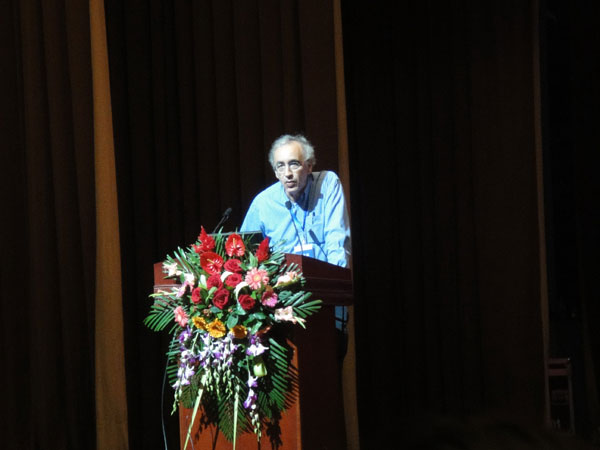A French Chinese or a Chinese Frenchman?

After more than 200 trips to China since 1973, Joel Bellassen speaks Mandarin fluently and has visited 24 Chinese provinces and autonomous regions. [Photo provided to China Daily]
A pair of worn black shoes has accompanied Joel Bellassen all over the world.
Sitting at the window in the hostel at the Beijing International Studies University, the 64-year-old Frenchman says he doesn't recognize where he is, although he has been to 24 provinces and autonomous regions of China more than 200 times and speaks Mandarin like one born in China. "It's easy to find skyscrapers in almost any large city in this country," he says, "but it's hard to distinguish one from another."
Bellassan is general inspector of Chinese language at France's Ministry of National Education. He traveled to Beijing this time with an academic tour and to give a speech on "Current difficulties of teaching Chinese as a foreign language".
His bag always contains the Xinhua Dictionary and a Contemporary Chinese Dictionary. His favorite Chinese story is "Kong Yiji", written by Lu Xun.
"I love the ending of the story: Kong Yiji may have been dead," Bellassen says. He is obsessed by this kind of uncertainty.
Bellassen has been fascinated by the Chinese for 45 years. In 1969, he chose Chinese as his major at the Universit Paris 8. "I was interested in Chinese ideographs and had a burning curiosity about this remote, mysterious, eastern country."
In 1973 the two countries restored the cultural exchange programs which had been halted by China's "cultural revolution". This gave him a chance and he started his first China journey with other 29 college students.
"It was like going to the moon," Bellassen recalls. "My grandmother tried to persuade me to stay at Paris because China was comparatively underdeveloped."
"But I did not change my decision," he says. "Who would give up an opportunity to go to the moon just because of the harsh conditions?"
Tense times
Despite the restoration of cultural exchange, 1973 was still during the period of China's "cultural revolution". "I visited all of my classmates after we finished our exchange program in China," he acknowledges. None of them had taken part in political movements before, during or after their China stay.
"We came to China in the political sensitive period, but we studied here mainly out of curiosity," he says.
Arriving in China after a 22-hour flight, Bellassen got his first sight of Beijing. A few people riding late in the night, as he recalls. A portrait of Chairman Mao hung on the airport's terminal building.
In the 1970s, Chinese people were still curious about any foreigners in the "cultural revolution" atmosphere. "One day I went to Wangfujing, Beijing's commercial district, to buy a pair of shoes," he says.
"I got hundreds of people's attention in the street."
In order to understand China and the "cultural revolution", Bellassen and his French classmates persisted in applying for permission to travel to rural communes and factories and work there. They could not get permits because of their foreign identities.
When it came to his second academic year of 1974, he was given a chance to go to Sijiqing People's commune in Beijing's western suburb and live together with local farmers and workers.
"At first, I could not bear the breakfast of cornmeal porridge," he says. "In the first few weeks, I ate meat three times only." Eventually, though, he changed. "The ordinary cornmeal porridge made me forget about baguettes and cheese and I came to know the original life of China."
Even now living in Paris, he still prefers Chinese breakfast.
Language boost
"My Chinese improved beyond my expectation when I was staying with these local people. After two-years of study in China, Bellassen went back to France in 1975. He took part-time jobs teaching Chinese in primary and middle schools, and college in Paris.
Since finishing his PhD dissertation on "Chinese people's philosophic life", he has been involved in Chinese education and cultural diffusion.
Bellassen admires current foreign students studying Chinese since they have much more convenient learning conditions with the application of multimedia.
Before the summer holiday in 2014, there were 37,000 senior high school students choosing Chinese as one of the subjects for their college entrance exams, he says. "Half of them have been studying Chinese since middle school."
People of the two countries still have misunderstanding of each other, despite the fact that China and France have had diplomatic ties for 50 years. Many Chinese people cannot tell the difference between French cuisine and Italian food, Bellassen says. "There are still a lot of French people who think that Japanese kimonos originate in China."
"China and Europe may be geographically distant," he says, "but globalization has shortened and will continue shortening the distance between China and the Western world in cultural awareness."
In the Chinese expert's view, China and France share some similarities: centuries-old history, splendid culture and the people's yearning for a comfortable lifestyle.
Regardless of these similarities, Bellassen is not pleased by China's fast pace of change. He admits that living conditions have been much improved in China and foreign products can now be found easily here.
"But the heavier air pollution and newly built, strange buildings mean that my second hometown, Beijing, has lost its unique city character," the Frenchman said. It's hard for him to feel the charm and mystery of the ancient capital.
"Beijing's soul is the quadrangle of Siheyuan, the city wall and gates, beside the Tian'anmen Square and the Forbidden City," he says.
"Foreigners started to learn about China in the days of Marco Polo," he says. What Bellessan has been doing is tell France about the whole history and culture of China.


